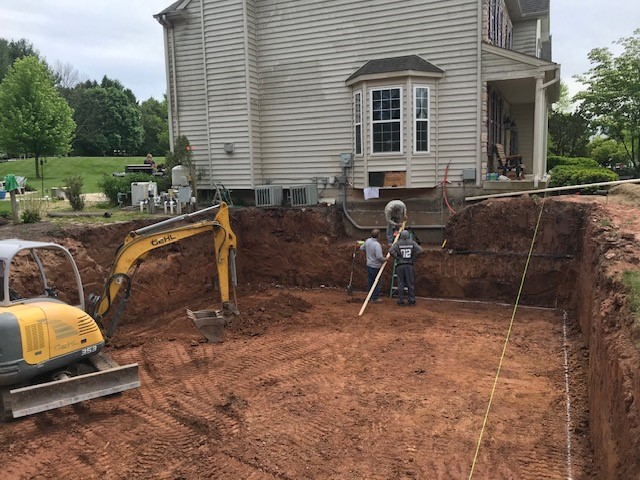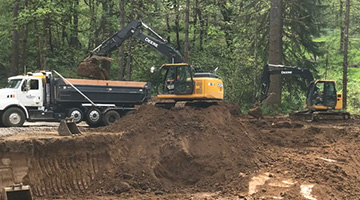Business Lancaster Trenching - Trenching Providers for Organizations in Lancaster
Business Lancaster Trenching - Trenching Providers for Organizations in Lancaster
Blog Article
Comprehensive Excavation Strategies: Mastering the Basics for Success
The careful preparation, exact execution, and precise attention to information needed in excavation jobs demand a comprehensive approach that encompasses numerous essential aspects. The real mastery exists not simply in comprehending these fundamentals yet in effortlessly integrating them to browse the complexities of excavation projects with skill.
Comprehending Excavation Project Preparation

Successful excavation tasks are developed on the structure of complete and precise preparation. The preliminary stage of any type of excavation task is the planning phase, where vital decisions are made that can substantially impact the result of the task. Throughout this stage, it is important to gather all relevant information about the site, including topographical surveys, soil structure, and any kind of prospective risks that may exist. Recognizing the job timeline, extent, and budget restrictions is important for creating a detailed excavation plan that makes certain the project's success.
One key element of excavation project planning is the growth of a comprehensive timeline that outlines the sequence of tasks, milestones, and due dates. By thoroughly taking into consideration all these elements throughout the planning stage, excavation jobs can be implemented effectively and properly, leading to successful results - septic ohio.
Soil Analysis and Website Evaluation
Carrying out thorough soil analysis and site analysis is a vital action in the preparation phase of any excavation task. Soil analysis entails figuring out the structure, structure, and buildings of the dirt at the excavation website. This details is essential for understanding the soil's bearing capacity, moisture content, and potential for erosion, which are key factors in identifying the excavation methods and equipment needed for the project.
Website analysis goes past dirt evaluation and incorporates a broader assessment of the overall site problems. This examination includes identifying any kind of possible dangers, such as underground utilities, environmental concerns, or unpredictable surface, that might impact the excavation procedure. By extensively reviewing the website, job managers can develop effective excavation approaches that focus on security, effectiveness, and environmental management.
Making use of innovative innovations like ground-penetrating radar, soil sampling, and drone studies can boost the accuracy and efficiency of dirt analysis and website examination. Investing time and resources in these initial steps can inevitably save time and prevent pricey hold-ups or problems throughout the excavation process.
Equipment Choice and Utilization
Reliable excavation projects count heavily on tactical equipment choice and use to make certain optimal performance and efficiency. Selecting the appropriate equipment for the work is vital in making best use of effectiveness and decreasing downtime. Elements such as the kind of soil, depth of excavation, and task scope play a considerable role in figuring out the most appropriate tools for the job available.

In enhancement to picking the ideal tools, correct application is vital to task success. Operators has to be educated to take care of the tools securely and successfully - lancaster excavation. Normal upkeep checks and prompt repairs help protect against breakdowns and ensure consistent performance throughout the project
Precaution and Rules Compliance
In the realm of excavation projects, prioritizing security procedures and conformity with laws is vital to making sure a lawfully sound and protected operational atmosphere. Security steps encompass a series of practices, consisting of carrying out complete site analyses, executing correct signage and obstacles, and offering ample security training for all personnel included in the excavation procedure. Adherence to guidelines, such as OSHA requirements in the United States, ensures that the excavation job meets the needed standards to secure workers, onlookers, and the surrounding setting.

Surveillance Development and Adjusting Strategies
How can predict supervisors efficiently track the improvement of excavation projects and adapt their methods as necessary to optimize outcomes? Tracking progression is essential for making sure that excavation tasks remain on track and satisfy target dates.

Verdict
In final thought, mastering the principles of extensive excavation strategies is essential for the success of any kind of project. By recognizing job planning, assessing soil and website conditions, picking proper equipment, abiding by safety laws, and keeping track of progression, job supervisors can guarantee a effective and smooth excavation process. Carrying out these techniques will certainly bring about successful results and decrease prospective threats or setbacks during the excavation task.
The preliminary phase of any excavation task is the preparation stage, where critical decisions are made that can considerably impact the result of the project. Understanding the project extent, budget, and timeline restraints is essential for producing a thorough excavation plan that ensures the project's success.
Just how can predict supervisors effectively track the development of excavation jobs and adapt their methods appropriately to maximize end results? By very closely keeping track of development and being prepared to adapt methods, job supervisors can boost the general success of excavation jobs.
By comprehending job planning, evaluating soil and site problems, picking ideal tools, abiding with security guidelines, and checking development, job supervisors can make sure a smooth and effective excavation process.
Report this page